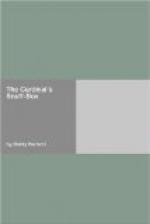“Yes—perhaps there is,” she admitted thoughtfully.
And with that, they looked into each other’s eyes, and laughed.
“Are you aware,” the lady asked, after a brief silence, “that it is a singularly lovely evening.”
“I have a hundred reasons for thinking it so,” Peter answered, with the least approach to a meaning bow.
In the lady’s face there flickered, perhaps, for half a second, the faintest light, as of a comprehending and unresentful smile. But she went on, with fine detachment
“How calm and still it is. The wonderful peace of the day’s compline. It seems as if the earth had stopped breathing—does n’t it? The birds have already gone to bed, though the sun is only just setting. It is the hour when they are generally noisiest; but they have gone to bed—the sparrows and the finches, the snatchers and the snatched-from, are equal in the article of sleep. That is because they feel the touch of autumn. How beautiful it is, in spite of its sadness, this first touch of autumn—it is like sad distant music. Can you analyse it, can you explain it? There is no chill, it is quite warm, and yet one knows somehow that autumn is here. The birds know it, and have gone to bed. In another month they will be flying away, to Africa and the Hesperides—all of them except the sparrows, who stay all winter. I wonder how they get on during the winter, with no goldfinches to snatch from?”
She turned to Peter with a look of respectful enquiry, as one appealing to an authority for information.
“Oh, they snatch from each other, during the winter,” he explained. “It is thief rob thief, when honest victims are not forthcoming. And—what is more to the point—they must keep their beaks in, against the return of the goldfinches with the spring.”
The Duchessa—for I scorn to deceive the trustful reader longer; and (as certain fines mouches, despite my efforts at concealment, may ere this have suspected) the mysterious lady was no one else—the Duchessa gaily laughed.
Yes,” she said, “the goldfinches will return with the spring. But isn’t that rather foolish of them? If I were a goldfinch, I think I should make my abode permanent in the sparrowless south.”
“There is no sparrowless south,” said Peter. “Sparrows, alas, abound in every latitude; and the farther south you go, the fiercer and bolder and more impudent they become. In Africa and the Hesperides, which you have mentioned, they not infrequently attack the caravans, peck the eyes out of the camels, and are sometimes even known to carry off a man, a whole man, vainly struggling in their inexorable talons. There is no sparrowless south. But as for the goldfinches returning —it is the instinct of us bipeds to return. Plumed and plumeless, we all return to something, what though we may have registered the most solemn vows to remain away.”
He delivered his last phrases with an accent, he punctuated them with a glance, in which there may have lurked an intention.




